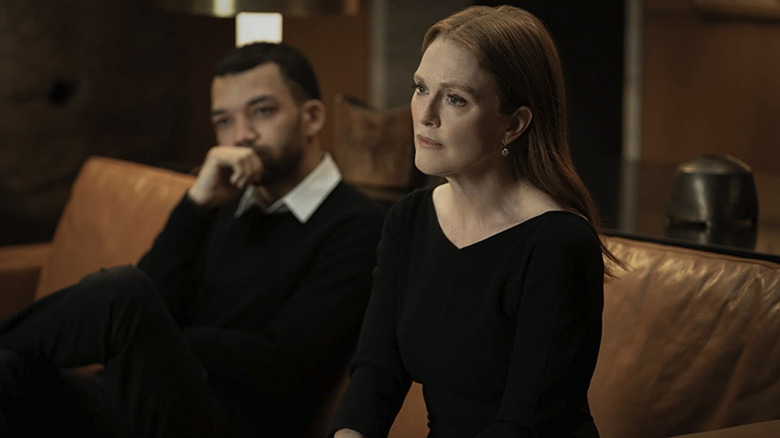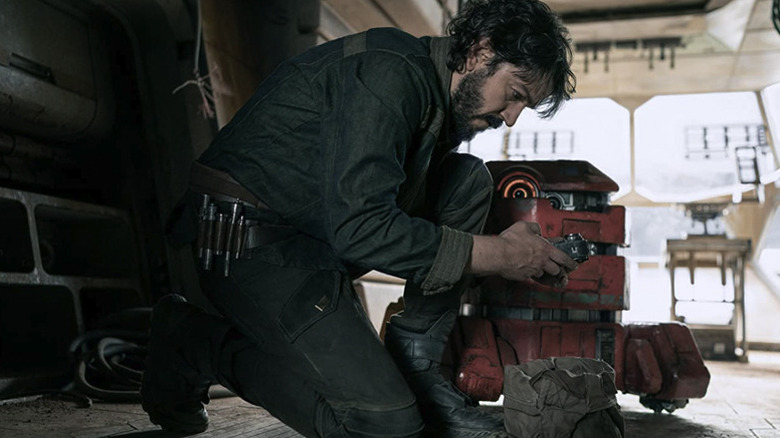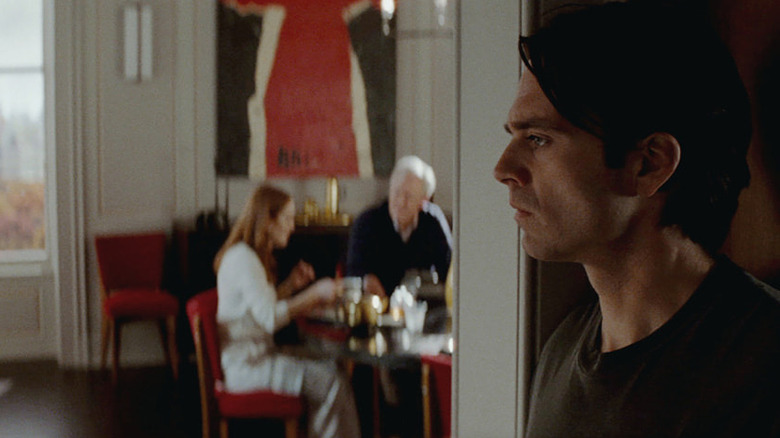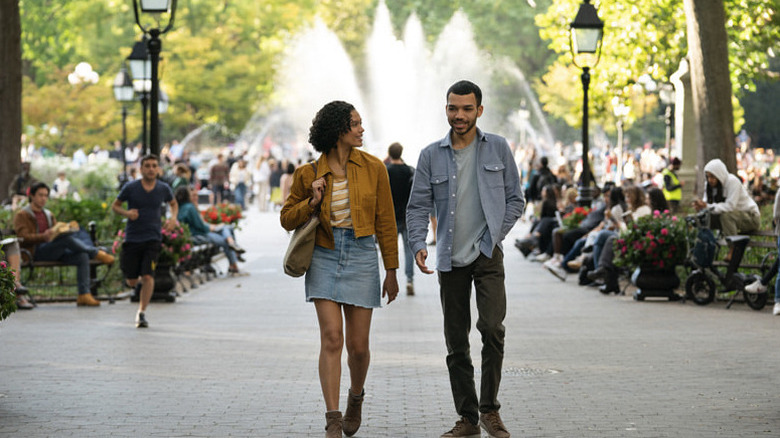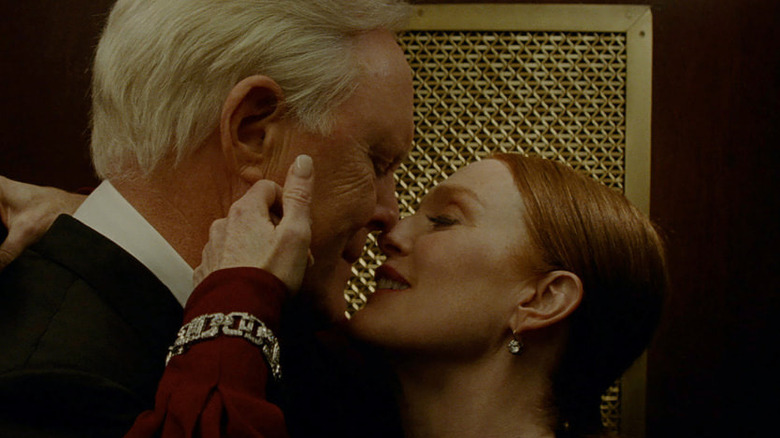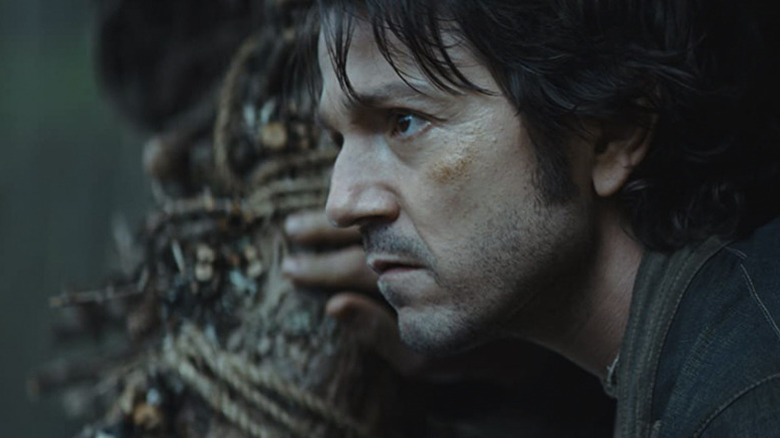Sharper Director Benjamin Caron On His Twisty New Neo-Noir [Exclusive Interview]
I love a good con film. "The Crown" and "Andor" director Benjamin Caron has delivered a new one as his feature directorial debut in the form of "Sharper," a twisty Apple TV+ neo-noir about a bunch of people in New York City who are angling to get what they want. Con men, billionaires, gold diggers, and victims collide in this fascinating examination of the lengths people will go for greed, and it has a killer cast: Julianne Moore, John Lithgow, Sebastian Stan, Justice Smith, and the stellar Briana Middleton, who not only hangs with these relative veterans, but practically leaps off the screen. In a movie full of theft, the most impressive one of all is how Middleton steals this movie with her performance.
I had the chance to speak with Caron in the lead-up to his film's release, and ask him about his influences, how he kept the audience surprised, and more.
Note: This interview has been lightly edited for clarity and brevity.
'If you say yes, it's going to happen'
Did you finish your work on "Andor" and then go straight into making "Sharper"? What was the timeline there?
I was filming "Andor" from January 2021 to about April. And in December, I'd been meeting Julianne Moore, meeting producers, meeting the studio about "Sharper" with a view to possibly directing it. It wasn't that straightforward because there was another project which I was meant to be doing. It was a passion project that I'd been developing for a long time, actually with Vanessa Kirby. And I was convinced it was going to happen.
But I'd read "Sharper," and it was one of those scripts: It was sort of funny, it was character-driven, it was an original movie, it was kind of a thriller about sexual politics and trust and betrayal. I just loved all the twists and all the reversals in there. So I'd read it and loved it and I started meeting everyone. And I said, "Look, I'm not sure I can do this. You want to start in the summer. I've got this other film. And I'm doing 'Andor' right now and I'm going to struggle to give you lots of my time." And [producers] Erik [Feig] and Julie [Moore] were like, "Oh, no. We just want you to meet the people from Apple and maybe the people at A24." ... I talked about my passion for the film, and then I went back to directing "Andor."
I got a call on a weekend, I think it was really early in January. And the producer was like, "Look, Julie wants you to do it. The studio, Apple and A24, want to do it. Basically, the movie is green lit if you say yes. It's going to happen." And so it was that moment where my entire life I'd been waiting to — I wasn't quite sure when that moment would happen. Here is a fully packaged. Here is a film that you like, and you've read, that you've enjoyed, that you want to make. And then someone's going, "If you say yes, it's going to happen." So of course I just ... yes. And the other film I was developing had fallen down a little bit and it looked like it probably wasn't going to happen, so I just jumped to it. So I'd said yes to that, and then basically went into filming "Andor" in the dark winter months of January.
That went all the way through until May, and we were casting in the background. So I was starting to meet potential Maxes, and then trying to find Sandra. Because I knew that, for me, was the most important part in "Sharper." And I liked the idea of finding an unknown. Someone that we could launch. With the help of my casting director, we found Briana. She just popped up and it was like, "Wow, she's amazing." Basically, there's no one else — she has to be the one that plays Sandra.
So we did casting and then in the summer, I moved out with my whole family to New York, and we started shooting in September. So yeah, it was a busy year. It was a mad year.
'I want you to be the Princess of Darkness on this'
Tell me a little bit about your influences on this. Were you looking at other con movies for inspiration, visually or otherwise?
A little bit, I guess. I'd looked at "House of Games," the David Mamet film. I went back and looked at "The Sting." I remember even there's a film called "The Grifters," which is by a British director, Stephen Frears. "The Color of Money." So yeah, I went back and reminded myself of some of those. But probably one of the biggest reference points for me was "Klute." There was just something about the atmosphere of that film that I've always loved. And it was something about how Pakula and Gordon Willis, who was the cinematographer on that, sort of known as the...
The Prince of Darkness.
The Prince of Darkness. Exactly that. So I said to Charlotte [Bruus Christensen], who was our brilliant cinematographer on this, I was like, "Look, I want you to be the Princess of Darkness on this. I want us to think about these sophisticated compositions of using light and darkness, and I love how they used the shadows and those underexposed long takes." He just basically infused every frame with meaning and atmosphere, and there was a beautiful delicacy to it. So it was a heavy leaning into the feeling of that film.
And there was a bit of "Drive" in there, I loved some of those sequences that they did in "Drive." And even a bit of "Seven." The very end of "Seven" when they go out to desert. And what I loved about that film is that you were so claustrophobic for such a long period of time. You were held in that city. It was all mainly shot at night and it was rain, but then right at the very end of the film, you suddenly had this big desert expanse where there was nothing else. There was nowhere else to hide. And I loved the idea that [in "Sharper"], we had all these characters penned into Manhattan, where the sight lines are limited and you can rarely see the horizon. But then, as in "Seven," I love the end where suddenly you're in this open space where you can see nothing but sky, and ultimately the characters have nowhere to hide.
So yeah, we basically go out and we're inspired by and maybe just rob [laughs], rob other filmmaker's ideas.
I never thought about the "Seven" connection, but as soon as you said it, instantly I thought about that parking lot and the comparison that you're making there. That's a subtle connection, I think.
I talked a lot about perspective in each chapter. The writers, Brian [Gatewood] and [Alessandro Tanaka], are brilliant. The script's online. It was on the Black List. It had been around for a while before it was actually brought to Julie's attention. And she read it and knew and saw there was a great part in there for Madeline. It was very much, "Here is Tom. Here is Sandra. Here is Max. Here is Madeline."
The end is quite different to how it actually is now. But I just love that perspective and I love telling that story from each character's point of view, apart from in the final chapter — I think it's successful, but I tried to let go of that perspective for the audience. I want the audience to feel suddenly a lack of individual perspective, which hopefully adds to the suspense. You're taking the stabilizers off slightly, so that you are not entirely sure who you're now with and whose point of view you're playing from.
'Deception is definitely the defining feature of this film'
You said somewhere that when you watch a movie like this, you want to feel constantly surprised and slightly behind where you think you are. So I'm curious if there were any tricks that you employed to accomplish that here. It sounds like that idea of losing the individual perspective at the very end was maybe part of that. But were there any filmmaking tricks or decisions you made to be in the audience's perspective and achieve that feeling you want to feel when you're watching one of these movies?
Deception is definitely the defining feature of this film, and I'm always interested in character's motivations and how people talk or flirt or lie or impersonate in terms of getting what they want. I thought it was really important in this film that we never had a nod and a wink to the audience at any moment that something was about to happen. Sometimes I think there's a tendency, whether it be from the storyteller or even from the performer, to show too much. And I think right from the very beginning, even in conversations with the actors, we wanted to hold all of that back. Because I really remember reading the script and I really remember those moments where I was floored and I was genuinely shocked and surprised. So it was really important they held onto that integrity.
I remember talking to Justice about this. In some of the later scenes where he knows more than we as the audience should know that he knows at that point. And he had a tendency to want to go and show that. But I was like, "You can't do that. The audience are so savvy. They're so intelligent that if they see any little blip, little disconnect, all their Spidey senses are going to go off." And of course, this film invites you to do that. Pretty much from about 20 minutes in, it declares itself as the kind of film it's going to be. Then immediately you are questioning everything that you see, and that's the fun of it. So I think performance was a big thing. To play the scene as honestly as we possibly can and just let the story itself pull all the punches that I think it had brilliantly worked out.
Music was another thing, actually. We had the most amazing composer. We had Clint Mansell doing our score. He was the only composer I went to, and thankfully he said yes. I just think what he brings to a tone and a feel is just sublime. We had long conversations about some of these early scenes we scored, but we weren't quite sure how we were scoring them, because there was a dishonesty to the score. We were trying to lie to the audience by scoring something different. We tried it, and it just didn't work. So actually we don't hear a piece of his music until right at the very end of the first chapter, like 20 minutes in, which suddenly scores Tom's emotional journey in that moment when he discovers something. Up until then, we just have some needle drops, which is a bit more fun in terms of the romance of Tom and Sandra. So I think not using music to be dishonest, I remember that being quite revealing.
I think the perspective was important. Again, if we were in Tom's chapter, we see and feel everything from his point of view. And then we go to Sandra's, and that involves the photography. Always not being ahead of that character in the film. So we literally experience it with them as it happens along.
The other thing was actually, I don't know whether you felt the seasons in the film. I don't know whether that was something that came across. Because we don't declare the timeline and the non-linearness of it, which is I enjoyed right from the beginning, I thought it'd be quite fun to use the seasons as a way of taking us through the timeline. I was trying to use seasons to convey a tone and feeling, but also to play around with the timeline and the narrative. So when we meet Tom in the beginning, it was springtime in New York. I just thought that was a classically romantic season and a perfect time to fall in love. I live in Notting Hill where Richard Curtis made "Notting Hill." So it was sort of my New York version of that. And Tom is like spring: He embodies hope and new beginnings. So we pushed into that. Whereas some of the later chapters — Sandra, for instance — we were in the winter. It's the harsher realities of her life. There are these difficulties. There are limitations.
'We had him for about five days'
I know you've worked with John Lithgow before and I'm curious if you have any Lithgow stories from this set. Is there anything that jumps to mind when I say that?
He's the most beautiful human being and, as everyone knows, the most wonderful actor. We worked together five years ago when he played Winston Churchill in "The Crown," which he went on to win an Emmy for, and I've stayed in touch with him ever since. I've been to L.A. We've been out. Hilariously, he's taken me for tea somewhere near where he lives. I've always said to him, "When I have something, I want you to be in it." And this just came up, and he was available. He just said yes straight away. It was amazing. We had him for about five days, I think.
I remember on set, the end of filming, he got everyone together and he made this beautiful speech about how he was really proud to have been in my first feature film, and he just spoke really kindly. I'm British, so I get a bit embarrassed about this, but he just talked about how amazing our work together had been, right from the very beginning on "Assassins" and "The Crown." He was like a father figure, almost. He was so happy that I was making this film and that he could be in it. And he did it in front of all the crew. It was incredibly embarrassing, but very effusive and very touching.
Then he sent me an email. He was down in South America, and we'd had this test screening in L.A., which is so — I've never done that before. I've never had to go to it. I've never had a test screening for any of my work. You just don't do that in high-end television, but obviously in movies, you do that. So we'd had this test screening. Thankfully, it had gone it well and people enjoyed it, and he sent me an email. He was down in South America with his wife who's a lecturer, and he was in the [elevator] and some guy just got in and was like, "Oh, hi, Mr. Lithgow. I'm a huge fan of you as an actor." And he's like, "Oh, great." The guy said, "I've just seen you in a film called 'Sharper.'" And he looked to them and was like, "How have you seen that?" And he said, "Oh, I saw it in L.A. I went to this test screening." The guy said, "You are amazing and it's such a brilliant film and the audience loved it." And [Lithgow] said he was just grinning in this elevator. Because obviously you never know, you just want these things to be good. And anyway, he sent me this lovely email afterwards going how proud he was that in a random elevator somewhere in South America, a guy just bumped into him and told me how brilliant the film is. Anyway. That's what I can remember.
'Directing is always about simplifying'
That's awesome. I did want to ask you one thing about "Andor," because I loved that show so much. I've heard you talk about how the writing is obviously so terrific on that show, but the direction was fantastic as well. I'm curious if you had a personal mantra when it came to your approach to directing your episodes. Was there any guiding light idea that you returned to if you ever came to a fork in the road about anything?
Yes. So my approach, probably, to anything I do, and this didn't really change with "Andor," and maybe that's what was so appealing to Tony when we met. Because I was like any other kid. I was into "Star Wars" when I was a kid, but I wasn't an obsessed "Star Wars" fan, and I declared that to him. But I responded to the writing and to Tony's writing. And my guiding principle is always to look at the emotional weather of the script and to focus on the anthropological strangeness of these people and find the uncomfortable stuff, the piece of gravel in the shoe and the emotional texture of the story that I can basically amplify through the visuals. That's the guiding principle that I use across everything.
For me, I've just learned that directing is always about simplifying. You throw everything in, it's always too much, and you just reduce it. You take everything away until you've got the bare minimum. That's all I could do on "Andor."
The other thing was, don't get overawed by the texture in these worlds. I really wanted you to feel that this universe, this planet, these communities, could totally exist. So don't fetishize the people of Ferrix. It is a working community of people, and they're going about their jobs. So allow your characters to breathe and travel through the thing, but don't fetishize that world. Just make it as believable and as tactile, so you can smell and taste it and inhale that world, while trying not to put it on a pedestal.
"Sharper" hits theaters on February 10 and arrives on Apple TV+ on February 24, 2023.
